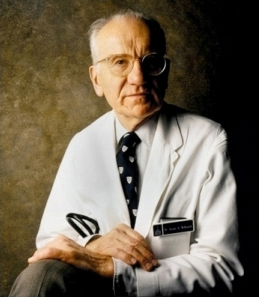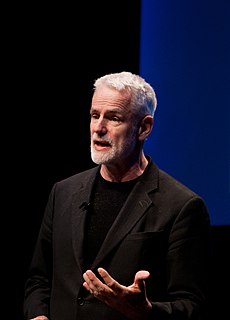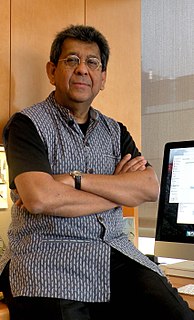Related Research Articles

Victor Almon McKusick was an American internist and medical geneticist, and Professor of Medicine at the Johns Hopkins Hospital, Baltimore. He was a proponent of the mapping of the human genome due to its use for studying congenital diseases. He is well known for his studies of the Amish. He was the original author and, until his death, remained chief editor of Mendelian Inheritance in Man (MIM) and its online counterpart Online Mendelian Inheritance in Man (OMIM). He is widely known as the "father of medical genetics".
deCODE genetics is a biopharmaceutical company based in Reykjavík, Iceland. The company was founded in 1996 by Kári Stefánsson with the aim of using population genetics studies to identify variations in the human genome associated with common diseases, and to apply these discoveries "to develop novel methods to identify, treat and prevent diseases."
Statistical genetics is a scientific field concerned with the development of statistical methods for drawing inferences from genetic data. The term is most commonly used in the context of human genetics. Research in statistical genetics generally involves developing theory or methodology to support research in one of three related areas:

Kári Stefánsson is an Icelandic neurologist and founder and CEO of Reykjavik-based biopharmaceutical company deCODE genetics. In Iceland he has pioneered the use of population-scale genetics to understand variation in the sequence of the human genome. His work has focused on how genomic diversity is generated and on the discovery of sequence variants impacting susceptibility to common diseases. This population approach has served as a model for national genome projects around the world and contributed to the realization of several aspects of precision medicine.

Ranajit Chakraborty was a human and population geneticist. At the time of his death, he was Director of the Center for Computational Genomics at the Institute of Applied Genetics and Professor in the Department of Forensic and Investigative Genetics at the University of North Texas Health Science Center in Fort Worth, Texas. His scientific contributions include studies in human genetics, population genetics, genetic epidemiology, statistical genetics, and forensic genetics.
Public health genomics is the use of genomics information to benefit public health. This is visualized as more effective preventive care and disease treatments with better specificity, tailored to the genetic makeup of each patient. According to the Centers for Disease Control and Prevention (U.S.), Public Health genomics is an emerging field of study that assesses the impact of genes and their interaction with behavior, diet and the environment on the population's health.
The Genome-based Research and Population Health International Network (GRaPH-Int) is an international collaboration of experts and researchers focused in the area of population health. The principal goal of the network is to promote the translation of genome-based science and technology into improvements in population health.
Genetic epidemiology is the study of the role of genetic factors in determining health and disease in families and in populations, and the interplay of such genetic factors with environmental factors. Genetic epidemiology seeks to derive a statistical and quantitative analysis of how genetics work in large groups.
Himla (Himladevi) Soodyall is a South African geneticist involved in finding some of the oldest human genetic lines, mainly focusing on Sub-Saharan Africa. Her work on DNA has pointed to southern Africa as the most likely geographic region of origin of the human species.

Alan Edward Guttmacher, M.D. was the director of the National Institute of Child Health (NICHD), one of the 27 institutes and centers that comprise the National Institutes of Health (NIH). In that capacity, he oversaw the institute’s activities as the focal point at the NIH for research in pediatric health and development, maternal health, reproductive health, intellectual and developmental disabilities, and rehabilitation medicine, among other areas.

Aravinda Chakravarti is a human geneticist, an expert in computational biology and the 2008 President of the American Society of Human Genetics.
Dr. Vinod Scaria FRSB is an Indian researcher pioneering in Precision Medicine and Clinical Genomics in India. He is best known for sequencing the first Indian genome. He was also instrumental in the sequencing of The first Sri Lankan Genome, analysis of the first Malaysian Genome sequencing and analysis of the Wild-type strain of Zebrafish and the IndiGen programme on Genomics for Public Health in India

Nilanjan Chatterjee is a Bloomberg Distinguished Professor of Biostatistics and Genetic Epidemiology at Johns Hopkins University, with appointments in the Department of Biostatistics in the Bloomberg School of Public Health and in the Department of Oncology in the Sidney Kimmel Comprehensive Cancer Center in the Johns Hopkins School of Medicine. He was formerly the chief of the Biostatistics Branch of the National Cancer Institute's Division of Cancer Epidemiology and Genetics.
Felix Israel Domeno Konotey-Ahulu FGA, FRCPSG, FRCP, FWACP is a Ghanaian physician and scientist who is Kwegyir Aggrey Distinguished Professor of Human Genetics at the University of Cape Coast, Ghana, and a consultant physician/genetic counsellor, Haemoglobinopathy/Sickle Cell States, in Harley Street, London. He is one of the world's foremost experts on sickle-cell disease.

Elaine Ann Ostrander is an American geneticist at the National Human Genome Research Institute (NHGRI) of the National Institutes of Health (NIH) in Bethesda, Maryland. She holds a number of professional academic appointments, currently serving as Distinguished and Senior Investigator and head of the NHGRI Section of Comparative Genomics; and Chief of the Cancer Genetics and Comparative Genomics Branch. She is known for her research on prostate cancer susceptibility in humans and for conducting genetic investigations with the Canis familiaris, the domestic dog model, which she has used to study disease susceptibility and frequency and other aspects of natural variation across mammals. In 2007, her laboratory showed that much of the variation in body size of domestic dogs is due to sequence changes in a single gene encoding a growth-promoting protein.
Simin Liu is an American physician researcher. He holds leadership positions internationally in the research of nutrition, genetics, epidemiology, and environmental and biological influences of complex diseases related to cardiometabolic health in diverse population. His research team has uncovered new mechanisms and risk-factors as well as developed research frameworks for diabetes and cardiovascular diseases. Liu's laboratory conducts research mainly in the United States, though the group has had research collaborations, teaching, and service activities in six of the Seven Continents.
Josée Dupuis is a Canadian biostatistician. She is a professor in the Boston University School of Public Health, where she chairs the department of biostatistics. Her research interests include genome-wide association studies, gene–environment interaction, and applications to diabetes and cardiovascular disease.

Charles Nohuoma Rotimi is the Director of the Trans-National Institutes of Health (NIH) center for research in genomics and global health. He works to ensure that population genetics include genomes from African populations and founded the African Society of Human Genetics in 2003. Rotimi was instrumental in the launch of the Human Heredity and Health in Africa (H3Africa) with the NIH and the Wellcome Trust. He was elected to the National Academy of Medicine in 2018.

Joan Ellen Bailey-Wilson is an American statistical geneticist. She is a senior investigator and co-chief of the Computational and Statistical Genomic Branch of the National Human Genome Research Institute.
Kiran Musunuru is an American cardiologist who is a Professor of Medicine at the University of Pennsylvania Perelman School of Medicine. He researches the genetics and genomics of cardiovascular and metabolic diseases. Musunuru is a leading expert in the field of gene-editing.
References
- 1 2 3 4 5 6 7 8 "Muin J. Khoury". CDC. 2019-01-28. Retrieved 2019-05-31.
 This article incorporates text from this source, which is in the public domain.
This article incorporates text from this source, which is in the public domain.